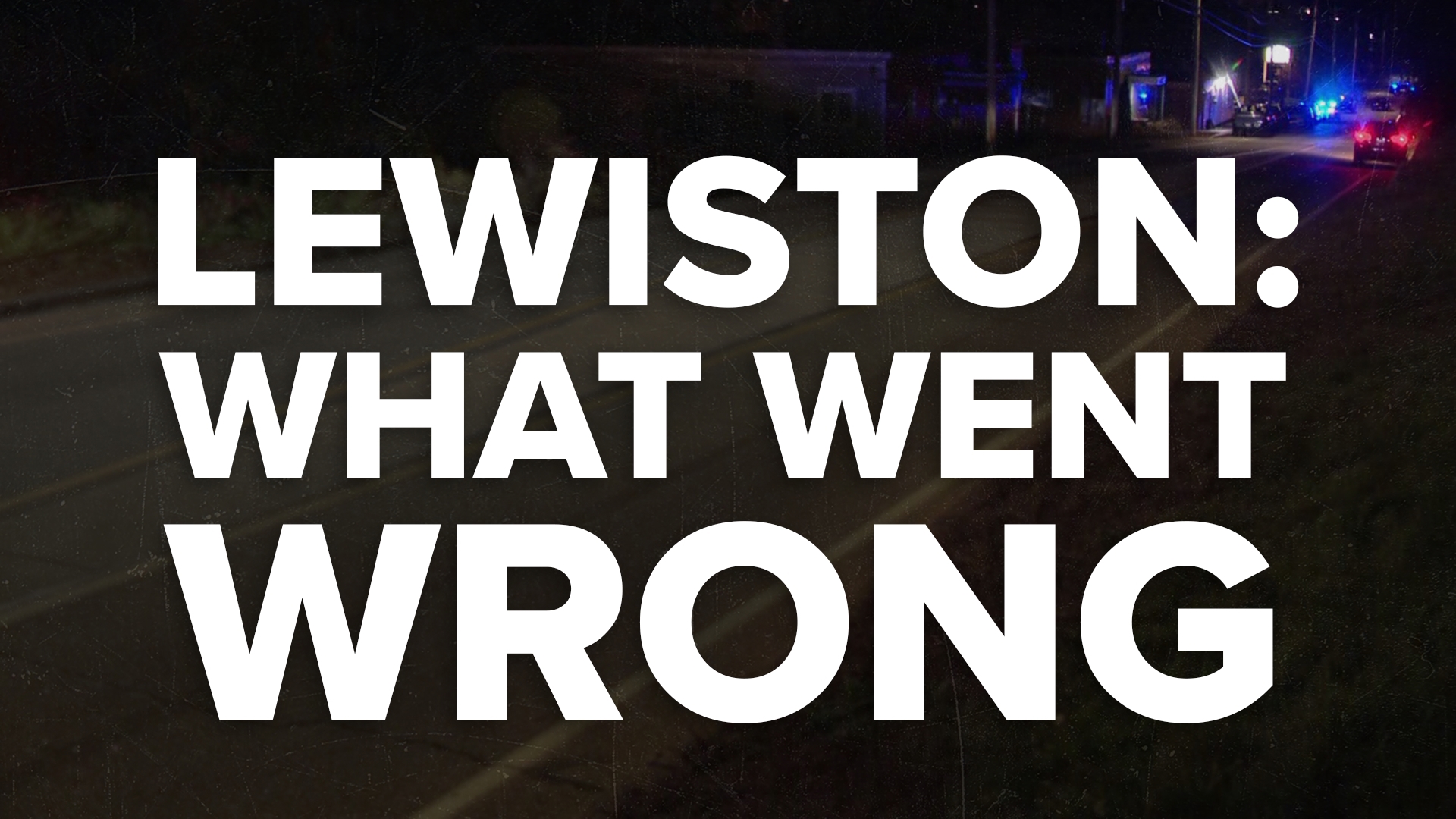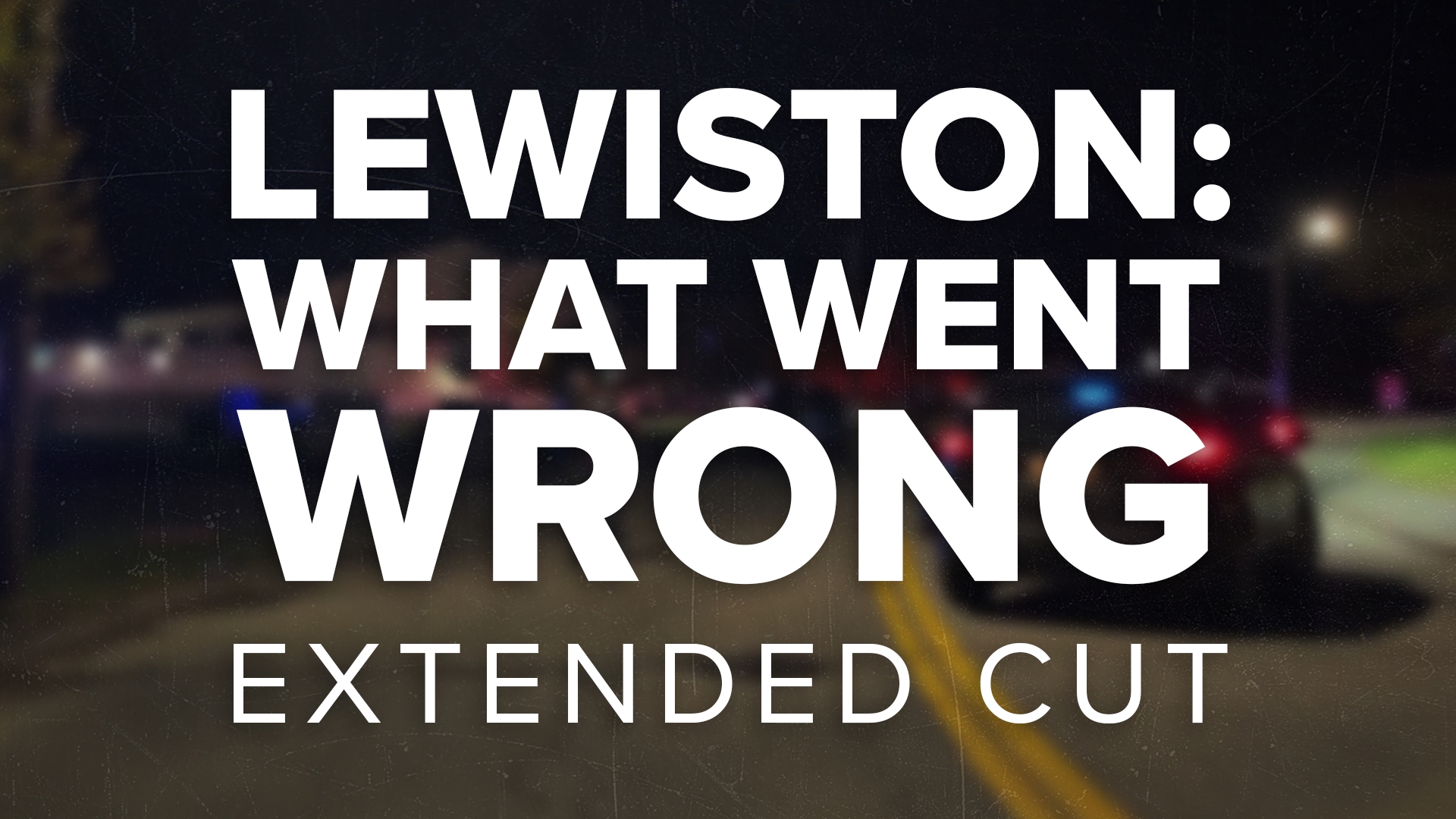Lewiston: What Went Wrong
This documentary is a hard-hitting 77-minute film exploring in-depth the circumstances preceding and the aftermath of Oct. 25, 2023, mass shooting.

The documentary "Lewiston: What Went Wrong" is a hard-hitting 77-minute film exploring in-depth the circumstances preceding and the aftermath of the Oct. 25, 2023, mass shooting that killed 18 people and saw 13 other people wounded by gunfire in Maine’s second-most populous city.
Building on the work completed and public hearings held by the independent Lewiston commission appointed by Maine’s governor, as well as the investigation by the U.S. Army, the film presents a detailed chronology of how local law enforcement handled tips about the gunman, Robert Card, and how the Army treated the long-time reservist prior to his violent attack.
It reviews the manhunt for Card after he fled the two crime scenes, how elected Maine leaders addressed gun safety issues after the tragedy, and how victims’ families are planning to achieve accountability for their losses.
Watch the five individual segments from our film here.
Lewiston: What Went Wrong Yellow Flag Law
Maine’s first-in-the nation yellow flag law allows law enforcement agencies to confiscate guns from owners deemed a threat to themselves or others, following a medical and judicial review.
The law was relatively new when Robert Card’s family and Army Reserve friends raised concerns about his declining mental state.
How did the sheriff’s office with jurisdiction over Card’s hometown respond? Why did it fail to invoke the law that could have disarmed Card?
Lewiston: What Went Wrong Army Orders
Prior to his mental decline in 2023, Robert Card was a member in good standing of the U.S. Army Reserve with 20 years of service.
When his troubling behavior reached a crisis point last summer, the Army ordered him to a psychiatric hospital.
But after Card was discharged, a follow-up care plan was not followed, and the Army did not communicate his danger to Maine law enforcement.
Lewiston: What Went Wrong Manhunt
After carrying out a rare mass shooting in two locations and the first such attack in Maine history, Robert Card was on the run.
A massive manhunt ensued for an expert marksman known to own a small arsenal of powerful assault rifles and handguns.
How did state police officials search for Card? What were the early clues? What clues were missed? And why did it take two days to track him down?
Lewiston: What Went Wrong Gun Debate
When Maine state legislators reconvened in January, gun safety bills introduced by leaders of the Democratic majority in both chambers were on the agenda, such as expanded background checks for gun buyers, imposing a new three-day waiting period to collect legally purchased guns, and banning devices that make long guns fire more rapidly.
There was also discussion about limiting the bullet capacity of gun magazines and banning semi-automatic assault weapons. Which proposals passed and which ones failed? And why?
Lewiston: What Went Wrong Accountability
One year after the Lewiston mass shooting, families of the people killed and attack survivors prepared to file a lawsuit against the U.S. Army for failing to stop what they call a preventable tragedy.
Attorneys for the plaintiffs argue the Army had numerous warnings to act to contain Card and inform local law enforcement of his rising danger to the community.
At the same time, Maine’s U.S. senators are seeking reforms in how the Army reports cases like Card’s to their home states and how the military monitors enlisted soldiers and reservists exposed to training and combat that may cause traumatic brain injuries.
Lewiston: What Went Wrong Extended Interviews
Watch these extended excerpts from eight original interviews with key voices in our film.
Mike Sauschuck
The commissioner of Maine’s Department of Public Safety became a familiar face during the manhunt for Robert Card, leading nationally televised briefings on its progress. We interviewed him following after-action reviews of the performance by the state police force.
Joel Merry
The sheriff of Sagadahoc County for the past 16 years leads the agency that had jurisdiction over Robert Card’s hometown and received the first tips about his declining mental health, delusions, and threats. His office did not attempt to confiscate Card’s weapons under Maine’s yellow flag law, and Merry is coping with the fallout.
Aaron Skolfield
A deputy sheriff in Sagadahoc County, with three decades of law enforcement experience, Skolfeld was assigned to conduct a welfare check on Robert Card in September 2023, a month before the mass shooting. But Skolfield never had a face-to-face meeting with Card and came under criticism by the Lewiston Commission.
Susan Collins
Maine’s Republican U.S. senator since 1997 is co-sponsoring two bills to reform the Army in response to Lewiston and the handling of the Card case. Now serving her fifth term, Collins is the most senior Republican woman in the Senate, is vice-chair of the Appropriations Committee and sits on the Intelligence Committee. We met with her at her home in Bangor.
Angus King
Maine's independent U.S. senator since 2013 is co-sponsoring two bills to reform the Army in response to Lewiston and the handling of the Card case. A former Maine governor now serving his second Senate term, King sits on the Veterans’ Affairs, Intelligence, and Armed Services Committee. We met with him in his hometown of Brunswick.
Nacole Palmer
Palmer leads the Maine Gun Safety Coalition, which advocates for measures to reduce gun violence. She fought for new gun control measures after the Lewiston mass shooting, including a new 72-hour waiting period for gun buyers and new red flag law.
David Trahan
Trahan, who leads the Sportsman’s Alliance of Maine, the state’s premier advocacy group for gun owner’s rights, was an architect of the yellow flag law, which allows weapons confiscations with due process protections, and has led to nearly 500 such orders since 2020, most after the Lewiston tragedy.
Travis Brennan & Ben Gideon
Brennan and Gideon are the local Maine attorneys leading litigation for families of Lewiston mass shooting victims and survivors. In representing 100 clients, Brennan, with Berman Simmons, and Gideon, with Gideon Asen, are partnering with two national law firms with experience in mass shooting liability cases.


